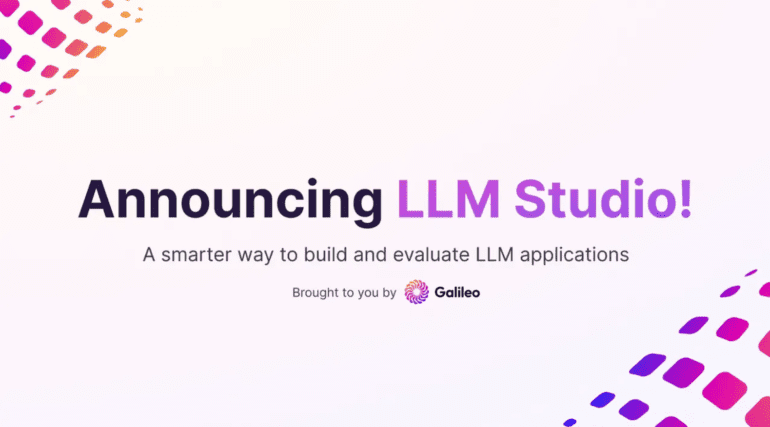TL;DR:
- Galileo introduced Galileo LLM Studio, a comprehensive platform for Large Language Model (LLM) applications.
- The platform includes Prompt, Fine-Tune, and Monitor modules, enhancing developer productivity and preventing hallucinations.
- Industry leaders emphasize the importance of evaluation, experimentation, and observability in deploying LLM-based applications.
- Galileo’s mission is to unlock the potential of unstructured data, covering text, images, speech, and more.
- LLM Studio addresses the need for governance frameworks in managing LLM applications effectively.
- The platform empowers teams to optimize prompts, fine-tune models, and continuously monitor performance.
- Galileo’s innovative solution sets a new standard for generative AI applications, benefiting businesses of all sizes.
Main AI News:
In a bold move that’s set to reshape the landscape of generative AI applications, Galileo, a trailblazing machine learning (ML) company specializing in unstructured data, has unveiled its revolutionary Galileo LLM Studio. This groundbreaking platform is designed to empower businesses by accelerating the development of trustworthy Large Language Model (LLM) applications and seamlessly transitioning them into production.
Previously comprised of Prompt and Fine-Tune modules, Galileo LLM Studio has taken a giant leap forward with the introduction of its third module, Monitor. This innovative addition ushers in a new era of continuous feedback for developers and data scientists, delivering invaluable insights and performance enhancement opportunities. What sets Galileo LLM Studio apart is its utilization of the Galileo Guardrail Metrics Store, a treasure trove of unique evaluation metrics meticulously crafted by Galileo’s esteemed research team. These metrics not only supercharge developer productivity but also fortify the system against hallucinations, or users can even fashion their own bespoke metrics.
As the digital landscape evolves, enterprises grapple with a multitude of challenges when operationalizing generative AI. From the intricacies of prompt engineering to the critical task of managing model performance, businesses must quantify the profound impact of these cutting-edge models. Hyoun Park, CEO and Principal Analyst at Amalgam Insights, asserts, “Enterprises face multiple challenges in operationalizing generative AI ranging from prompt engineering to managing model performance to quantify the impact of these models. Businesses seeking to translate the foundational large language models that are taking the world by storm into enterprise-ready applications need to take all of these aspects into account.”
Galileo, which was founded by former luminaries from Apple, Google, and Uber’s AI product and engineering teams, first emerged on the scene in 2022 with the industry’s premier ML data intelligence platform for handling unstructured data. This platform, which has already garnered the favor of startups and Fortune 500 giants alike, boasts robust support for Natural Language Processing (NLP), Computer Vision (CV), and now, Large Language Models (LLMs). Galileo’s overarching mission is to unlock the untapped value residing within unstructured data, a domain encompassing text, images, speech, and more, and which currently accounts for a staggering 80% of the world’s data.
As organizations across diverse sectors explore the myriad possibilities of generative AI, the imperative for sound governance frameworks to mitigate the risk of LLM hallucinations has never been more pronounced. Galileo’s LLM Studio emerges as a pivotal tool in this landscape, offering an indispensable evaluation toolchain spanning prompting, fine-tuning, and production monitoring. Waseem Alshikh, co-founder and CTO of Writer, a pioneering generative AI platform company, enthusiastically endorses it, saying, “There is a strong need for an evaluation toolchain across prompting, fine-tuning, and production monitoring to proactively mitigate hallucinations. Galileo’s LLM Studio offers exactly that toolchain. Highly recommend it to all LLM builders!“
Vikram Chatterji, co-founder and CEO of Galileo, emphasizes the company’s commitment to addressing the pressing needs of enterprises venturing into LLM-based applications. “We’ve spent the last year speaking with enterprises working to bring LLM-based applications to production, and three things became radically clear. First, companies of all sizes now have LLM-powered applications in production. Second, LLM output evaluation is painfully manual, with no guardrails against hallucinations. Third, teams are looking for sophisticated metric-driven monitoring for their applications in production. This need for LLM evaluation, experimentation, and observability was core to our latest release,” he says.
Galileo LLM Studio boasts three pivotal modules:
- Prompt: Empower teams to swiftly discover the ideal prompts while facilitating collaborative efforts to build, evaluate, and experiment, all geared towards optimizing performance and minimizing hallucinations.
- Fine-Tune: Providing users with the tools needed to fine-tune LLMs with precision, leveraging the right context and their own distinctive data. Galileo’s evaluation metrics simplify the identification of data elements that may be adversely affecting model performance.
- Monitor: Enabling the vital continuous feedback loop required for ongoing prompt and data enhancements, delivering an array of observability tools and evaluation metrics to meticulously monitor application performance in production. Key metrics include cost, latency, and hallucinations.
Conclusion:
Galileo’s LLM Studio represents a significant leap forward in the field of generative AI applications. This innovative platform equips businesses with the tools they need to harness the power of Large Language Models securely and efficiently. By addressing the key challenges associated with LLM development and offering robust evaluation and monitoring capabilities, Galileo is poised to reshape the market by enabling enterprises to confidently leverage unstructured data and stay at the forefront of technological advancements.

